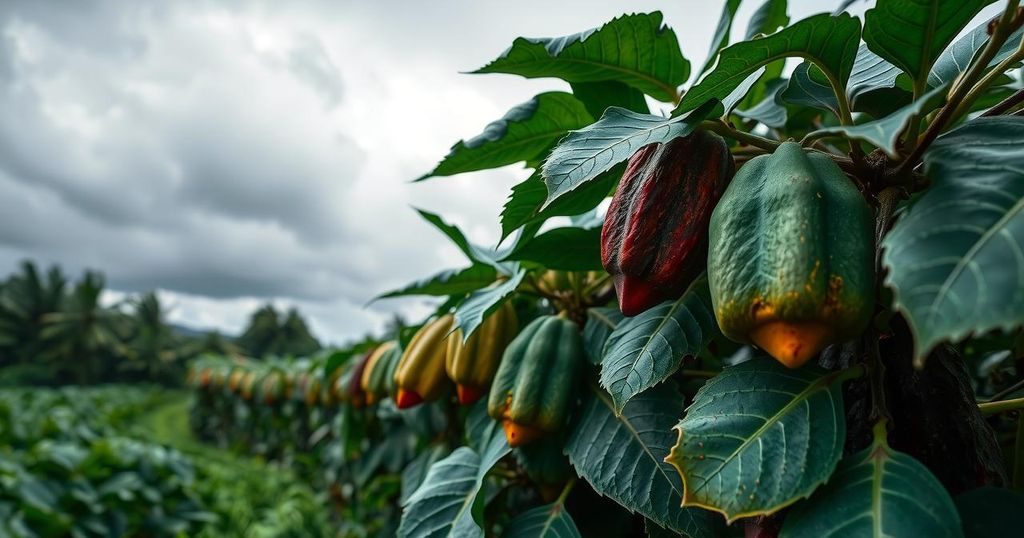A new report by Christian Aid reveals the dire impact of climate change on cocoa production, with prices surging by 400%. Rising temperatures and erratic weather threaten chocolate supply and farmers’ livelihoods, particularly in key producing countries like Côte d’Ivoire and Ghana. Businesses urge immediate action to adapt and sustain cocoa farming amid these challenges, especially as global demand continues to rise.
A recent report from Christian Aid highlights the severe impact of climate change on the cocoa industry ahead of Valentine’s Day. Cocoa prices have surged by 400% in recent years as climate change-related heatwaves have drastically affected cacao-producing regions in West Africa. Notably, temperatures exceeding 32°C have increased significantly, circling back to the detrimental conditions cocoa trees face, especially in Côte d’Ivoire and Ghana, which produce over half of the world’s cocoa.
In 2024, the ramifications of climate change led to six additional weeks of unseasonably high temperatures in 71% of cocoa-growing regions in West Africa. Andy Soden from Kernow Chocolate described the situation as a nightmare, noting that businesses involved in chocolate production have felt the adverse effects, especially as extreme weather patterns disrupt traditional growing seasons. The rising cocoa prices have made it increasingly difficult for smaller chocolate manufacturers to remain viable in the current market.
Christian Aid emphasizes the urgency of addressing climate change, urging for substantial cuts in emissions and climate finance directed towards cocoa farmers. Both small-scale growers and larger chocolate companies, including Nestlé, have reported struggles due to the increasing costs associated with cocoa production. The continuous rise in cocoa prices has led to significant alterations in the chocolate industry, prompting an urgent need for systemic change.
As cocoa harvests decline due to erratic weather patterns, the results have reverberated through global markets, with cocoa prices reaching record highs. The effects of extreme weather, characterized by unusual precipitation in 2023 and drought in 2024, have severely hampered production, prompting warnings from organizations about the sustainability of cocoa farming in the face of climate change. Osai Ojigho from Christian Aid stated that cocoa production is crucial for many impoverished communities, which are now facing dire circumstances due to these changes.
Cocoa farmers, such as Amelia and Aurelia from Guatemala, described their struggles with failing crops and the subsequent loss of income, indicating that climate change has made it nearly impossible to sustain their livelihoods. Andrew Soden and Alexander Carnwath from the Fairtrade Foundation reinforced the premise that sustainability in cocoa production extends beyond environmental concerns to encompass social and economic viability.
Companies like Whitakers Chocolates pledge to promote sustainable cocoa farming practices and support fair pricing for farmers, recognizing that climate change presents a substantial threat to both cocoa producers and the future of chocolate. In summary, the cocoa industry is at a critical juncture as climate change continues to wreak havoc on production, necessitating an urgent response to sustain cocoa livelihoods and protect future chocolate production.
The cocoa industry faces unprecedented challenges from climate change, with record-high cocoa prices affecting both farmers and consumers. Urgent action is required to combat the climate crisis, including targeted financial aid for cocoa growers. Better practices in production and trade are essential to ensure sustainability and secure the livelihoods of those dependent on cocoa. The current situation underscores the interconnected nature of climate change and global economies, highlighting the need for collaboration between governments and businesses.
Original Source: reliefweb.int




